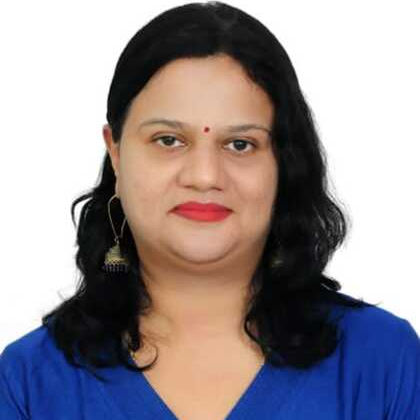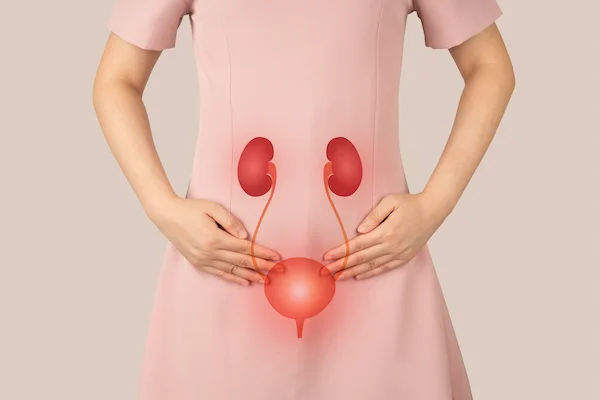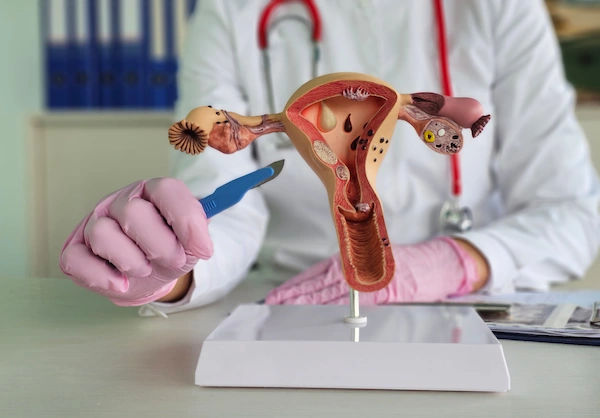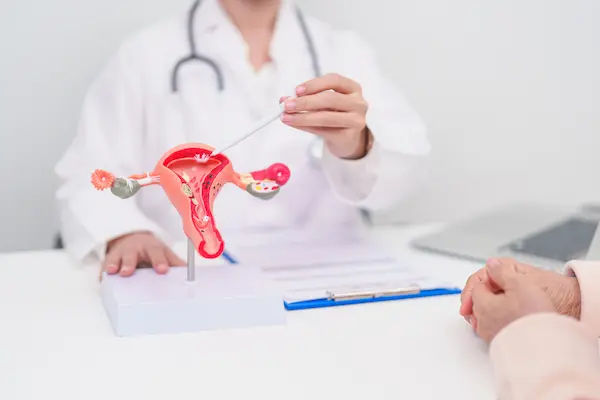Understanding Endometriotic Cysts and Their Meaning
Learn what endometriotic cysts (chocolate cysts) are, their symptoms, causes, and how to manage them. Get expert advice on diagnosis, treatment, and fertility support.


Endometriotic cysts, also known as endometriomas, are a common yet often misunderstood condition affecting many women. If you or someone you know has been diagnosed with this condition, it’s natural to have questions and concerns. This article aims to provide clear, compassionate, and easy-to-understand information about endometriotic cysts—what they are, their symptoms, causes, and how they can be managed.
What Are Endometriotic Cysts?
Endometriotic cysts are fluid-filled sacs that form when tissue similar to the lining of the uterus (endometrium) grows outside the uterus, usually on the ovaries. These cysts are a type of endometriosis, a condition where endometrial-like tissue implants itself in areas where it shouldn’t be.
Unlike regular ovarian cysts, endometriotic cysts contain thick, dark blood, giving them a characteristic "chocolate" appearance (hence the nickname "chocolate cysts"). While they are usually benign (non-cancerous), they can cause significant pain and fertility issues if left untreated.
Symptoms of Endometriotic Cysts
The symptoms of endometriotic cysts can vary from woman to woman. Some may experience severe discomfort, while others may have no noticeable symptoms at all. Common signs include:
- Pelvic Pain: Persistent pain in the lower abdomen, often worsening during menstruation.
- Painful Periods (Dysmenorrhea): Severe cramping that may interfere with daily activities.
- Pain During Intercourse (Dyspareunia): Discomfort during or after sex.
- Irregular Periods: Heavy bleeding or spotting between periods.
- Infertility: Difficulty getting pregnant due to cysts affecting ovarian function.
- Digestive Issues: Bloating, constipation, or diarrhea, especially during menstruation.
If you experience any of these symptoms, it’s important to consult a healthcare provider for proper evaluation.
Causes and Risk Factors
The exact cause of endometriotic cysts is not fully understood, but several theories exist:
- Retrograde Menstruation: When menstrual blood flows backward into the pelvic cavity instead of leaving the body, endometrial cells may implant on the ovaries.
- Genetic Factors: A family history of endometriosis increases the risk.
- Hormonal Imbalances: Excess estrogen may promote the growth of endometrial-like tissue.
- Immune System Issues: A weakened immune system may fail to clear misplaced endometrial cells.
Risk factors include:
- Being in your 30s or 40s
- Never having given birth
- Early onset of menstruation
- Short menstrual cycles (less than 27 days)
How Endometriotic Cysts Affect Health
Endometriotic cysts can impact a woman’s health in several ways:
- Chronic Pain: Persistent pelvic pain can affect quality of life, leading to fatigue and emotional distress.
- Fertility Challenges: Cysts may damage ovarian tissue or block fallopian tubes, making conception difficult.
- Adhesions and Scarring: Over time, cysts can cause scar tissue to form, leading to organ sticking together
(adhesions). - Ovarian Reserve Reduction: Large or multiple cysts may reduce the number of healthy eggs.
Diagnosis
If your doctor suspects an endometriotic cyst, they may recommend:
- Pelvic Exam: To check for unusual growths.
- Ultrasound: A transvaginal ultrasound helps visualize cysts.
- MRI: Provides detailed images for larger or complex cysts.
- Laparoscopy: A minimally invasive surgery to confirm diagnosis and remove cysts if needed.
Treatment and Management
While there’s no cure for endometriotic cysts, several treatment options can help manage symptoms and improve
quality of life:
1. Medications
- Pain Relievers: Over-the-counter NSAIDs (e.g., ibuprofen) can ease discomfort.
- Hormonal Therapy: Birth control pills, progestins, or GnRH agonists help shrink cysts by reducing estrogen levels.
2. Surgical Options
- Laparoscopic Cyst Removal: A surgeon removes cysts while preserving ovarian tissue.
- Oophorectomy: In severe cases, removal of the affected ovary may be necessary.
3. Lifestyle and Home Remedies
- Heat Therapy: A warm compress or heating pad can relieve pelvic pain.
- Anti-Inflammatory Diet: Foods rich in omega-3s (salmon, flaxseeds) and antioxidants (berries, leafy greens) may help
reduce inflammation. - Regular Exercise: Gentle activities like yoga or walking can improve blood flow and ease pain.
- Stress Management: Meditation and deep-breathing exercises can help cope with chronic pain.
Consult Top Gynecologist
4. Fertility Support
- If trying to conceive, fertility treatments like IVF may be recommended.
When to Seek Help
Consult a doctor if you experience:
- Severe pelvic pain
- Heavy, irregular periods
- Difficulty getting pregnant
- Pain during intercourse
Early diagnosis and treatment can prevent complications and improve outcomes.
How Apollo24|7 Can Help
If you suspect you have endometriotic cysts or need expert guidance, Apollo24|7 offers:
- Consultations with Gynecologists: Speak to specialists from the comfort of your home.
- Diagnostic Tests: Book ultrasounds or MRIs easily online.
- Personalized Treatment Plans: Get tailored advice for managing symptoms.
Don’t let endometriotic cysts control your life—reach out for support today.
Final Thoughts
Endometriotic cysts can be challenging, but with the right care, symptoms can be managed effectively. Understanding your condition, seeking timely medical help, and adopting healthy lifestyle changes can make a significant difference. Remember, you’re not alone—help is available, and many women lead fulfilling lives despite this condition.
If you have concerns, don’t hesitate to book a consultation with an Apollo24|7 specialist and take the first step toward better health.
Consult Top Gynecologist
Consult Top Gynecologist

Dr. Sai Lakshmi Daayana
Gynaecological Oncologist
18 Years • MBBS, MRCOG
Hyderabad
Apollo Hospitals Jubilee Hills, Hyderabad
(225+ Patients)

Dr. Rupam Manna
Radiation Specialist Oncologist
4 Years • MBBS MD(RADIO THERAPY)
Barasat
Diab-Eat-Ease, Barasat

Dr. Sreeparna Roy
Obstetrician and Gynaecologist
8 Years • MBBS , MS (OBSTETRICS & GYNAECOLOGY), Fellowship in Infertility, Endoscopy & Ultrasonography), Fellowship in Laparoscopy & Hysteroscopy,DRM
Kolkata
Dr Utsa Basu Clinic, Kolkata

Dr. Revathi S Rajan
Obstetrician and Gynaecologist
24 Years • MBBS, DGO, DNB.FFMM
Bengaluru
Apollo Clinic, JP nagar, Bengaluru
Dr. Navin Srinivasan
Gynaecological Oncologist
9 Years • MBBS, MS DNB(OBS-GYNAE), MCH (GYNAE ONCOLOGY)
Bengaluru
Apollo Clinic Mahadevapura, Bengaluru
Consult Top Gynecologist

Dr. Sai Lakshmi Daayana
Gynaecological Oncologist
18 Years • MBBS, MRCOG
Hyderabad
Apollo Hospitals Jubilee Hills, Hyderabad
(225+ Patients)

Dr. Rupam Manna
Radiation Specialist Oncologist
4 Years • MBBS MD(RADIO THERAPY)
Barasat
Diab-Eat-Ease, Barasat

Dr. Sreeparna Roy
Obstetrician and Gynaecologist
8 Years • MBBS , MS (OBSTETRICS & GYNAECOLOGY), Fellowship in Infertility, Endoscopy & Ultrasonography), Fellowship in Laparoscopy & Hysteroscopy,DRM
Kolkata
Dr Utsa Basu Clinic, Kolkata

Dr. Revathi S Rajan
Obstetrician and Gynaecologist
24 Years • MBBS, DGO, DNB.FFMM
Bengaluru
Apollo Clinic, JP nagar, Bengaluru
Dr. Navin Srinivasan
Gynaecological Oncologist
9 Years • MBBS, MS DNB(OBS-GYNAE), MCH (GYNAE ONCOLOGY)
Bengaluru
Apollo Clinic Mahadevapura, Bengaluru




